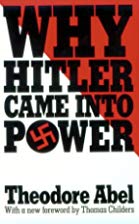 After having bought the book five and a half years ago I finally got around to reading last week The Loudest Voice in the Room: How the Brilliant, Bombastic Roger Ailes Built Fox News – and Divided a Country by Gabriel Sherman. Hopefully, now, I’m a little better informed about the role of the media in the United States. Not only the media, but I kept reflecting on the entire capitalist system, virtually unbridled. Courts appear to be sporting arenas where the rich can have their final showdowns against one another. But it was encouraging to be reminded that journalism is a profession and that journalistic ideals are still treasured by many trained in that area, though they may too often be frustrated by their corporate bosses.
After having bought the book five and a half years ago I finally got around to reading last week The Loudest Voice in the Room: How the Brilliant, Bombastic Roger Ailes Built Fox News – and Divided a Country by Gabriel Sherman. Hopefully, now, I’m a little better informed about the role of the media in the United States. Not only the media, but I kept reflecting on the entire capitalist system, virtually unbridled. Courts appear to be sporting arenas where the rich can have their final showdowns against one another. But it was encouraging to be reminded that journalism is a profession and that journalistic ideals are still treasured by many trained in that area, though they may too often be frustrated by their corporate bosses.
If Sherman’s book is a true indicator then I was surprised to learn that Fox News has had a far more powerful effect on both politics and the entire media landscape than I had realized. Simply ignoring and laughing at it did nothing to stop its growing influence in society and the political arena. Ailes so often reminded me of Donald Trump, too, and this book was written before Trump emerged on the political scene.
I don’t know who is directly in charge of Fox News now but I do learn from Trump that Fox occasionally broadcasts a story that is not favourable to him. I cannot imagine that happening under Ailes, but Rupert Murdoch does have a reputation (certainly in Australia and UK) of being something of a kingmaker through his media arms.
It’s an ugly scenario. News transformed into entertainment, more about making people “feel empowered/informed” than truly informing them.
 But two days ago a new book arrived, one originally published in the late 1930s, that put a different perspective on it all. Theodore Abel’s Why Hitler Came to Power, is a presentation of the words of Germans who lived through the Germany at the end of the First World War and who were influenced by Hitler. Their description of Germany in 1918 and 1919, the breakdown of society, the traumas of the population and of the armed forces, — one can see at a glance how WW2 was pretty much inevitable. There were moments when it did look like peace would emerge, but it only took a few more economic setbacks to put the whole thing back into a tailspin. Also interesting was the amount of loathing of the Nazis in Germany. Those who blame “the Germans” for WW2 do not do justice to the many.
But two days ago a new book arrived, one originally published in the late 1930s, that put a different perspective on it all. Theodore Abel’s Why Hitler Came to Power, is a presentation of the words of Germans who lived through the Germany at the end of the First World War and who were influenced by Hitler. Their description of Germany in 1918 and 1919, the breakdown of society, the traumas of the population and of the armed forces, — one can see at a glance how WW2 was pretty much inevitable. There were moments when it did look like peace would emerge, but it only took a few more economic setbacks to put the whole thing back into a tailspin. Also interesting was the amount of loathing of the Nazis in Germany. Those who blame “the Germans” for WW2 do not do justice to the many.
Another “little” analogy that came to mind: We cannot abide futility, of losing all, our dearest ones, our honour, everything, for nothing. It has to have meaning; it cannot have been all in vain. So grieving parents of a suicide bomber would be caught on TV saying that they were proud of their child, — and returning soldiers cannot agree that all they experienced was for nothing but loss of identity, loss of everything they held dear. The fight has to continue.
What sticks out through my early years as a lover of history in high school is the power and responsibility of a single person. I was taught to believe that “historical forces” created history: learn both (1) the background causes and then (2) the immediate causes of this or that historic moment. Really, though, it’s not so predictable. Sure, there are “forces” there, but unless a certain person with a certain makeup happens to exploit them for either personal or ideological motives, there is no telling which forces will simply wash themselves out which ones will continue to grow and consume others and change a nation’s direction.
And some readers thought I only read books about the bible!
